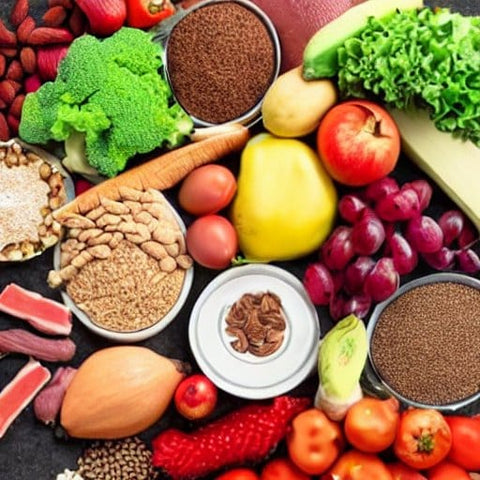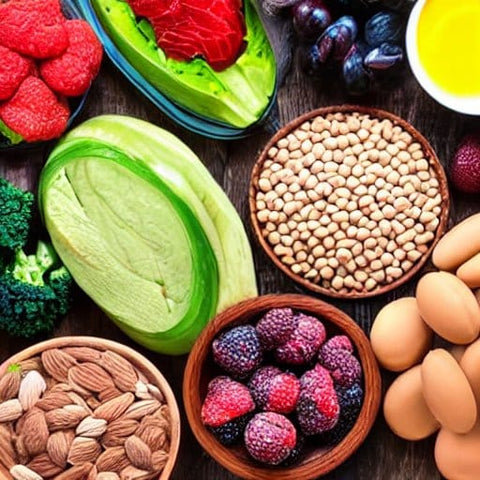What Does Protein Do?
Protein is an important nutrient that may be found in almost every cell and tissue in the body. It is vital for a healthy diet and it assists in the growth and development of your body.
Protein may be obtained from a wide variety of foods, the most common of which are red meat, poultry, fish, eggs, and dairy products. Additionally, plant sources are beneficial, particularly soy and beans.
Advantages that come from consuming protein:
- Builds and repairs muscles: Muscles can only be built and repaired with protein, which makes it particularly important for individuals to consume it after engaging in strenuous physical activity or exercise.
- Supports bone health: Eating an adequate amount of protein is essential for ensuring healthy bones, avoiding bone loss, and warding off osteoporosis as it helps to support bone health.
- Helps with weight management: Protein is more substantial than carbs, and eating it can help you feel satisfied for longer. This, in turn, can help you consume fewer calories altogether, which contributes to weight reduction and better control of your weight.
- Energy: Protein is an excellent source of both short-term and long-term energy, helping you to remain awake and concentrated throughout the day.
- Boosts metabolism: Consuming protein can cause your metabolism to speed up, which will result in your body burning more calories even when it's at rest.
- Improves mood and cognitive function: Positive effects on mood as well as cognitive function are brought about by the presence of amino acids in proteins. These amino acids are essential for the manufacture of neurotransmitters, which in turn can have a beneficial effect on both mood and cognitive function.
- Supports healthy skin, hair, and nails: Protein contains amino acids, which are essential building elements for healthy skin, hair, and nails. This means that eating protein can help support healthy skin, hair, and nails.
It Promotes Muscle Growth
Protein is an essential component in the development of new muscle tissue as well as the fact that it is the fundamental building block of muscles. In addition to this, it assists in the repair and maintenance of muscular tissues and improves muscle protein synthesis (MPS), a process that encourages development and increases strength.
Myosin and actin are the names of the two filaments that make up the complex structure that is a muscle. These filaments interact with one another to bring about the contraction of a muscle. These protein filaments will be damaged over time as a result of the mechanical stress induced by intensive exercise, which will ultimately contribute to the breakdown of muscle protein (MPB).
After then, in order to mend the injured parts, the body transports amino acids, which serve as the building blocks for muscle tissue, to the affected areas. After an exercise, your body goes through this process, which enables it to create larger, more powerful muscles.

Because your body is only capable of synthesizing nine of the 20 amino acids that are required to build up a protein molecule, it is imperative that you consume additional foods that contain these nutrients, including as meat, beans, and nuts, in order to maintain MPS. It might be challenging to consume sufficient quantities of these proteins via your diet, but it is feasible to consume sufficient quantities for maximum muscle development with a diet that is both well-balanced and high in protein.
Those who are attempting to add muscle mass to their bodies should make it a daily goal to ingest at least 0.8 grams of protein for every kilogram (g/kg) of body weight that they carry. This is the amount that is suggested for individuals who engage in very little physical activity, but more recent research shows that increasing your protein consumption above and beyond this level may actually stimulate muscle building when combined with resistance exercise.
In addition to protein, other components, such as carbs and lipids, may play a role in the development of muscle. Increasing the amount of these nutrients in your diet may also lead to an increase in protein synthesis, which in turn can lead to increased muscle development and a reduction in fat loss.
Consuming protein before, during, and after your exercises is highly recommended if your goal is to increase your muscle mass, since this is the period of time when your body requires it the most. Consuming a range of protein-rich meals throughout the day, such as lean meat, fish, and beans, is the most effective approach to accomplish this goal. Spreading out your protein consumption throughout the day is also important.
You may also try eating a few servings of protein before going to bed in order to encourage the production of MPS and speed up your recovery after an exercise. In order to ensure that your body receives the nutrients it needs to build muscle, you should try to consume three regular meals and two snacks spread out throughout the day at the very least.
It Mends the Ruptured Tissues
Protein is an essential building block for the tissues and organs in your body. It is also the cargo ship for your blood, which carries oxygen, vitamins, minerals, carbohydrates, and cholesterol all around your body and into the cells that need it in order to operate properly.
Proteins are essential for the function of many various processes inside the human body, including the formation of new tissue, the delivery of nutrients to cells, and the storage of nutrients so that they may be retrieved when they are required. Enzymes are a family of molecules that are responsible for breaking down or transforming nutrients into molecules that the cell can utilise, and the majority of these processes need their utilization.
A protein is a large molecule that is composed of many smaller molecules that are referred to as amino acids. The atoms of carbon, oxygen, and hydrogen that make up these amino acids may be rearranged in any sequence to build any kind of protein.
Certain amino acids may be made by your body, but in order to get the important ones, you need to get them from the food you consume. After being broken down into a certain set of combinations, the proteins that you consume subsequently enter your blood stream and are transported to the areas of your body that will utilise them.
During the process, they have the potential to be synthesised into proteins that perform essential functions for your body, including as helping you grow muscle, assisting you in burning fat, or even increasing the function of your brain. Peptides, which are short chains of amino acids that bond to one another in a certain manner, make up the majority of proteins. Peptides are the most frequent kind of protein.

There are a lot of different kinds of protein, and each one has a specific function in the body. Some are necessary for development and reproduction, while others assist you in carrying out day-to-day duties like healing your muscles and aiding in the formation of new cells.
The production of proteins in your body involves a complicated chain of chemical events, some of which include oxidation and others reduction. These mechanisms are essential to the capacity of the body to construct new tissues and repair damaged ones.
During this stage of the process, proteins serve as scaffolds, which allow additional molecules to be attached to or detached from the structure. They are also able to offer a variety of additional biochemical signals, which other molecules may use to learn how to move or react in a given situation.
According to the findings of a study that was carried out at the University of Bristol, the protein p53 is an essential component in the process of repairing epithelial tissue. It contributes to the induction of the formation of specialized migratory cells known as leader cells, which encourage the migration of epithelial cells and aid in the healing of wounds.
It is helpful in reducing body fat
Protein is an excellent source of energy for the body, and it also assists in the breakdown and removal of stored fat. When you are attempting to lose weight, it may be particularly useful since it has the potential to help suppress your appetite and boost the amount of calories you burn.
Protein aids in the development of lean muscle mass as well as the maintenance of current muscle mass during weight loss, both of which contribute to an increased calorie expenditure throughout the day. In addition, it may minimize the incidence of hunger as well as cravings for meals high in sugar, which will make it simpler for you to achieve your weight reduction objectives.
However, getting an adequate amount of protein in your diet might be challenging. The good news is that there are a variety of approaches you may take to include the suggested quantity into your day-to-day activities.
A diet high in protein will provide your body with a healthy quantity of nutrients, including amino acids, vitamins, minerals, and other components. This may be accomplished by eating a diet high in protein. In addition to this, they will strengthen your immune system and make your general health better.
By carefully weighing and measuring everything you put into your body, you can ensure that you are receiving the appropriate amount of protein in your daily diet. In order to guarantee that you are getting the recommended amount of protein each day, it is a smart idea to use a nutrition monitoring gadget to monitor the number of calories you consume on a daily basis.
The finest sources of protein are animal proteins, such as those found in meat, fish, eggs, and dairy products. These meals provide your body with all of the critical amino acids that it needs to function properly.
On the other hand, in addition to the meals listed above, your diet should also include a wide range of additional foods that are high in protein. Some of these items will be more full than others, so it's probably best to focus on eating complete foods that are high in protein rather than taking protein supplements.
Because protein is an essential nutrient, it is necessary for your body to have an appropriate quantity of it in order for it to be able to carry out the duties for which it was designed. Protein, in particular, is what goes into the construction of the cells that make up your body.
Because the metabolism of protein demands more energy than the metabolism of carbs or fats, eating a diet rich in protein may also help you lose weight. This phenomenon is referred to as the "thermic effect of food," or TEF for short.
Protein is an essential component for your cardiovascular system, which may help reduce the likelihood that you will suffer from cardiovascular disease or a stroke. This is due to the fact that it has the potential to assist in lowering your blood pressure. In addition to this, it may also assist in maintaining steady levels of glucose in your blood.
It assists you in maintaining your health
Along with carbs and fat, the body requires protein as one of its primary sources of the macronutrients known as macronutrients. It helps with everything from losing weight to building muscle, and it has a number of other positive effects on health as well.
Proteins are essential for the growth and maintenance of all cells, tissues, and organs in your body. Additionally, they assist you in maintaining a healthy immune system and in warding off sickness.
According to the National Institutes of Health, the human body is capable of producing over 10,000 unique kinds of proteins. All of these proteins are constructed from smaller building blocks referred to as amino acids, which are then linked together in chains. Depending on the order in which they are found in the chain of proteins, these proteins are capable of carrying out a variety of distinct jobs inside your body.
Even while your body is capable of producing the majority of the essential amino acids on its own, it must still get some of them from the food you eat. Your diet should consist of a range of sources of protein, including meals derived from plants as well as those derived from animals.
There are several different foods that are high in protein, including quinoa, meat, fish, dairy products, and eggs. Certain cuts of meat, such as beef, have a very high concentration of protein.
Additionally, beans, nuts, and seeds may all provide you with protein if you consume them. These meals often have a minimal amount of saturated fat, no cholesterol, and give fiber in addition to other nutrients that are beneficial to one's health.
On the other hand, you shouldn't consume more protein than is necessary to fulfill your requirements. The precise quantity that you need is determined by factors such as your age, weight, gender, and overall level of activity.
When you consume protein, your body processes it by breaking it down into its constituent amino acids and then reassembling those amino acids into the many types of proteins that are required by your body. According to Dr. Tewksbury's explanation, your body makes use of these proteins to construct muscles and other tissues.
According to him, persons who engage in regular physical activity have an increased need to consume an adequate amount of this vitamin since it enables them to both preserve and increase their existing levels of muscle mass. People who are obese, do not engage in enough physical exercise, or who have a medical condition such as diabetes may have a need to consume more protein than the RDA recommends.
Increasing the amount of protein you consume on a regular basis may have a variety of beneficial effects on your health, including lowering the chance of developing cardiovascular disease, cancer, and other diseases. Additionally, it may assist you in burning more calories, which can lead to a reduction in overall body fat as well as an increase in your level of energy.


















































Leave a comment